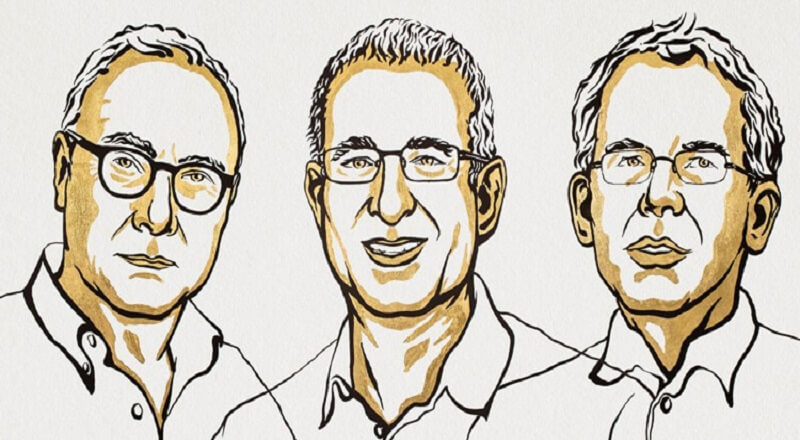The three laureates “have revolutionised empirical work in economics. They have shown that it’s indeed possible to answer important questions, even when it’s not possible to conduct randomized experiments,” Nobel Committee.
Stockholm: Three US-based academics on Monday won the Nobel Economics Prize for research on the labour market using “natural experiments”, or observational studies that have revolutionised empirical research in the field, the jury said.
Canadian-American David Card, Israeli-American Joshua Angrist and Dutch-American Guido Imbens shared the prize for providing “new insights about the labour market” and showing “what conclusions about cause and effect can be drawn from natural experiments,” the Nobel committee said in a statement.
The Economics Prize wrapped up a male-dominated 2021 Nobel season which saw a total of 12 men win prizes and only one woman.
Card, a Canadian-born professor at the University of California in Berkeley, won half of the 10-million-kronor ($1.1 million, one million euro) prize for work focused on the labour market effects of minimum wages, immigration and education.
In natural experiments, researchers study the result of chance events or policy changes on groups of people, unlike other experiments where scientists have control over their subjects.
Card’s studies from the early 1990s showed for example that raising the minimum wage does not necessarily lead to fewer jobs.
“We now know that the incomes of people who were born in a country can benefit from new immigration, while people who immigrated at an earlier time risk being negatively affected. We have also realised that resources in schools are far more important for students’ future labour market success than was previously thought,” the Nobel committee said.
However, data from a natural experiment is difficult to interpret.
For their work helping to solve that methodological problem, the other half of the prize went jointly to Angrist, 61, a professor at the Massachusetts Institute of Technology (MIT), and Imbens, a 58-year-old professor at Stanford.
In research they conducted in the mid-1990s, they demonstrated how “precise conclusions about cause and effect can be drawn.”
Revolutionising work
The framework they developed has been widely adopted by researchers who work with observational data.
“By clarifying the assumptions necessary to establish a causal relationship, their framework has also increased the transparency – and thus credibility – of empirical research,” the committee said.
“I was absolutely stunned to get a telephone call,” Imbens told reporters during a phone interview following the announcement.
“Josh Angrist was actually the best man at my wedding so he is a good friend, both professionally and personally, and I’m just thrilled to share the prize with him and David,” he added.
The three laureates “have revolutionised empirical work in economics. They have shown that it’s indeed possible to answer important questions, even when it’s not possible to conduct randomized experiments,” Nobel Committee member Eva Mork told reporters in announcing the prize.
Previous winners of the Nobel Economics Prize
The Nobel Economics Prize, the only Nobel prize not originally included in Alfred Nobel’s 1895 last will and testament, was established in 1968 to celebrate the Swedish central bank’s 300th anniversary.
Since it was first awarded in 1969, Americans have dominated the prize, and only two women have won.
Here is a list of the winners:
| 2020: Paul Milgrom and Robert Wilson (US) |
| 2019: Abhijit Banerjee (US), Esther Duflo (France-US), Michael Kremer (US) |
| 2018: William Nordhaus (US) and Paul Romer (US) |
| 2017: Richard Thaler (US) |
| 2016: Oliver Hart (Britain-US) and Bengt Holmstrom (Finland) |
| 2015: Angus Deaton (Britain-US) |
| 2014: Jean Tirole (France) |
| 2013: Eugene Fama, Lars Peter Hansen and Robert Shiller (US) |
| 2012: Alvin Roth and Lloyd Shapley (US) |
| 2011: Thomas Sargent and Christopher Sims (US) |
| 2010: Peter Diamond and Dale Mortensen (US) and Christopher Pissarides (Cyprus-Britain) |
| 2009: Elinor Ostrom and Oliver Williamson (US) |
| 2008: Paul Krugman (US) |
| 2007: Leonid Hurwicz, Eric Maskin and Roger Myerson (US) |
| 2006: Edmund Phelps (US) |
| 2005: Thomas Schelling (US), Robert J. Aumann (US-Israel) |
| 2004: Finn Kydland (Norway), Edward Prescott (US) |
| 2003: Robert Engle (US), Clive Granger (Britain) |
| 2002: Daniel Kahneman (Israel-US) and Vernon Smith (US) |
| 2001: George Akerlof (US), A. Michael Spence (US), Joseph Stiglitz (US) |
| 2000: James Heckman (US), Daniel McFadden (US) |
| 1999: Robert Mundell (Canada) |
| 1998: Amartya Sen (India) |
| 1997: Robert Merton (US), Myron Scholes (US) |
| 1996: James Mirrlees (Britain), William Vickrey (US) |
| 1995: Robert Lucas Jr (US) |
| 1994: John Harsanyi (US), John Nash (US), Reinhard Selten (Germany) |
| 1993: Robert Fogel (US), Douglass North (US) |
| 1992: Gary Becker (US) |
| 1991: Ronald Coase (Britain) |
| 1990: Harry Markowitz (US), Merton Miller (US), William Sharpe (US) |
| 1989: Trygve Haavelmo (Norway) |
| 1988: Maurice Allais (France) |
| 1987: Robert Solow (US) |
| 1986: James Buchanan (US) |
| 1985: Franco Modigliani (US) |
| 1984: Richard Stone (Britain) |
| 1983: Gerard Debreu (US) |
| 1982: George Stigler (US) |
| 1981: James Tobin (US) |
| 1980: Lawrence Klein (US) |
| 1979: Theodore Schultz (US), Arthur Lewis (Britain) |
| 1978: Herbert Simon (US) |
| 1977: Bertil Ohlin (Sweden), James Meade (Britain) |
| 1976: Milton Friedman (US) |
| 1975: Leonid Kantorovich (Soviet Union), Tjalling Koopmans (US) |
| 1974: Gunnar Myrdal (Sweden), Friedrich von Hayek (Britain) |
| 1973: Wassily Leontief (US) |
| 1972: John Hicks (Britain), Kenneth Arrow (US) |
| 1971: Simon Kuznets (US) |
| 1970: Paul Samuelson (US) |
| 1969: Ragnar Frisch (Norway), Jan Tinbergen (Netherlands) |


